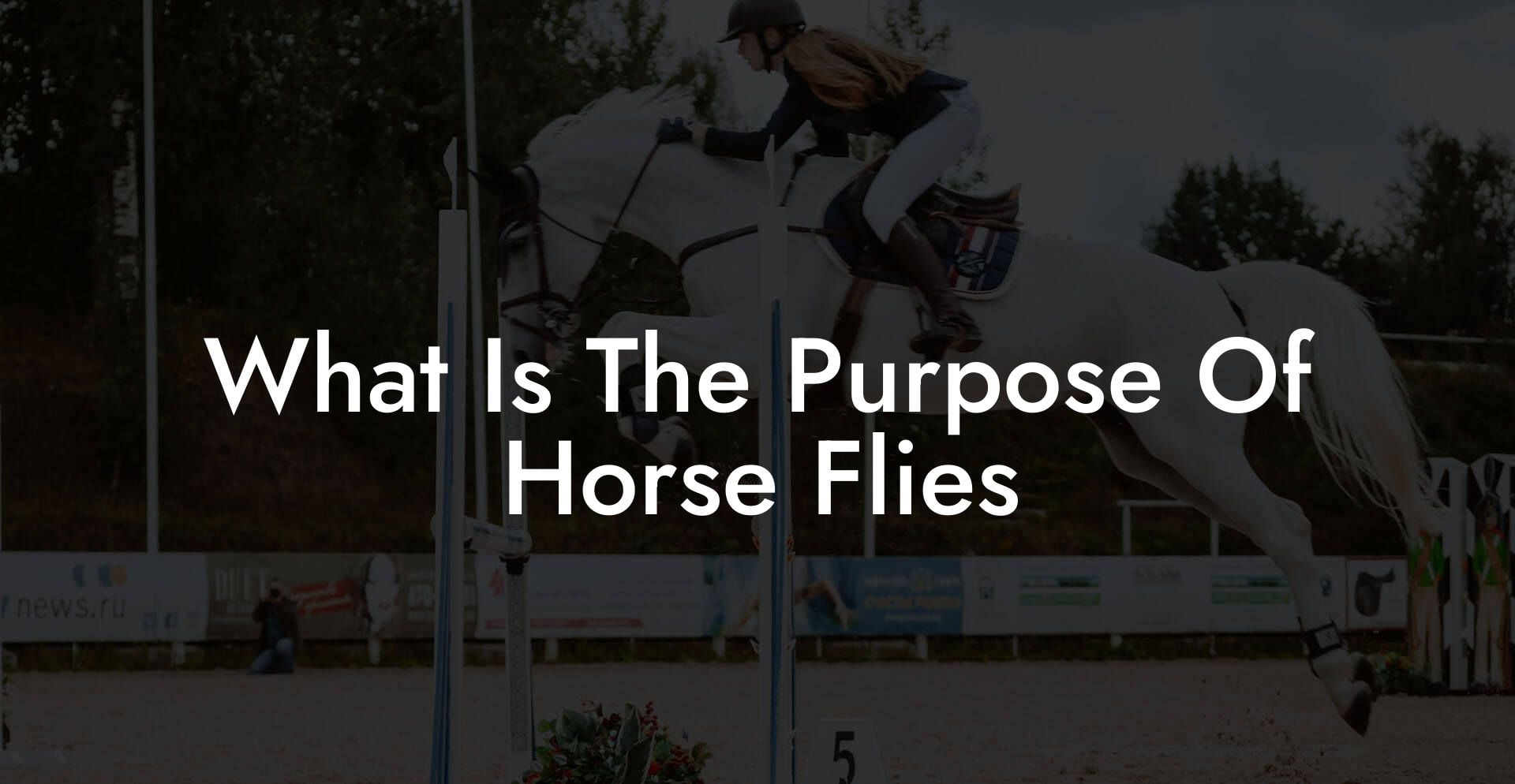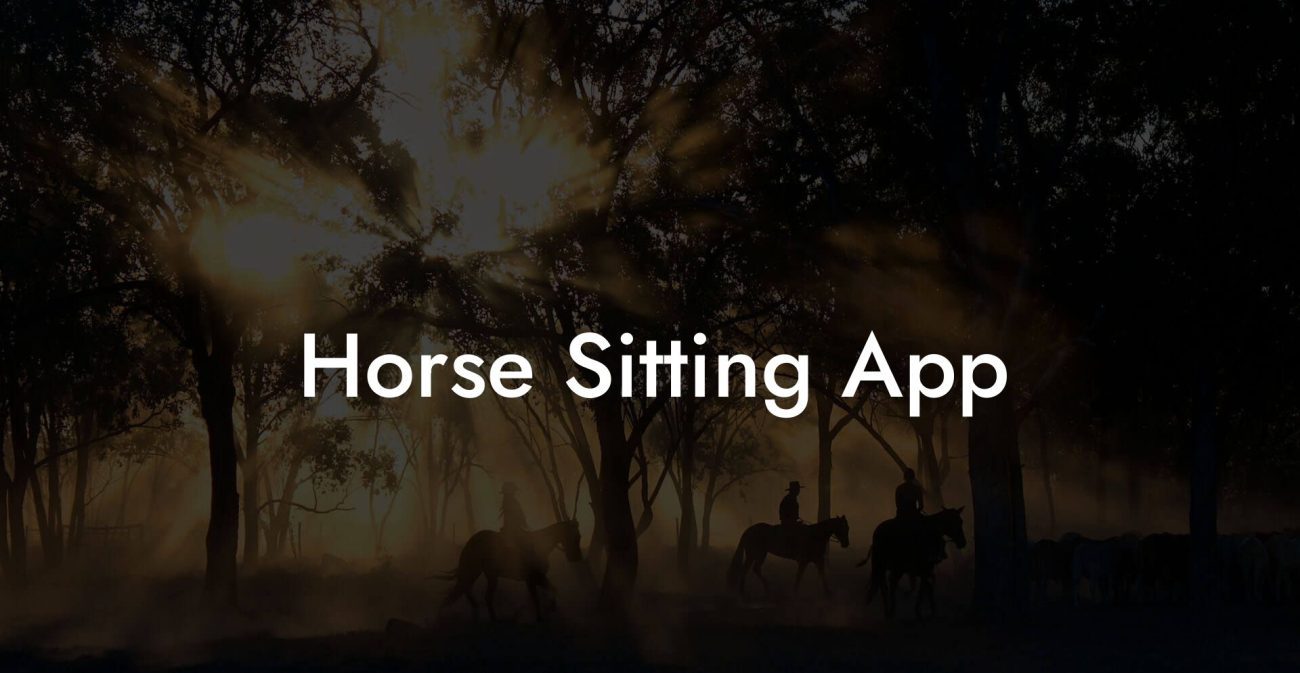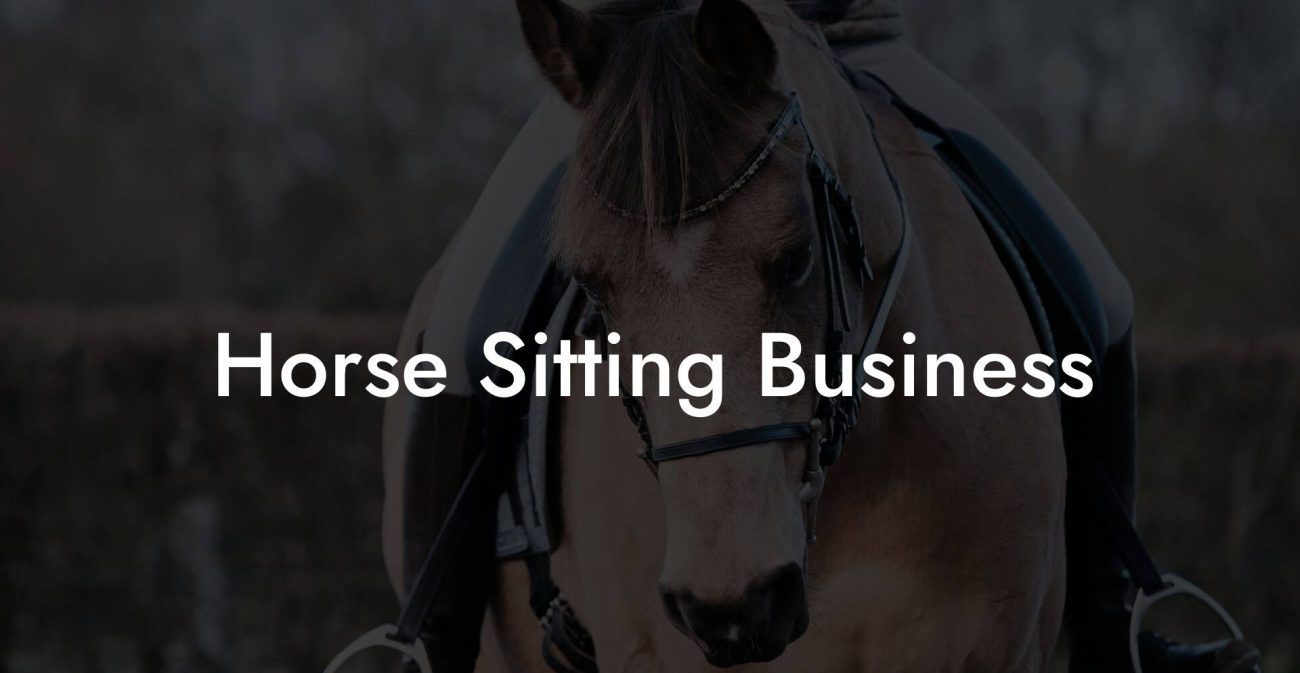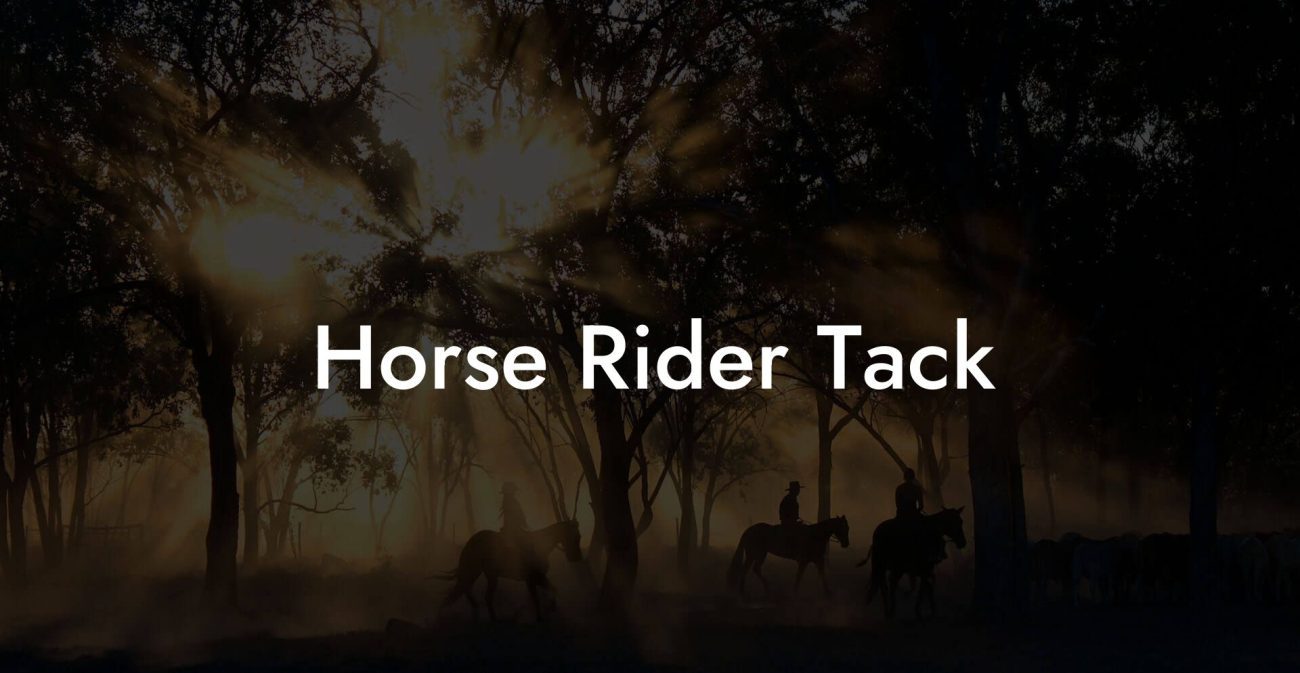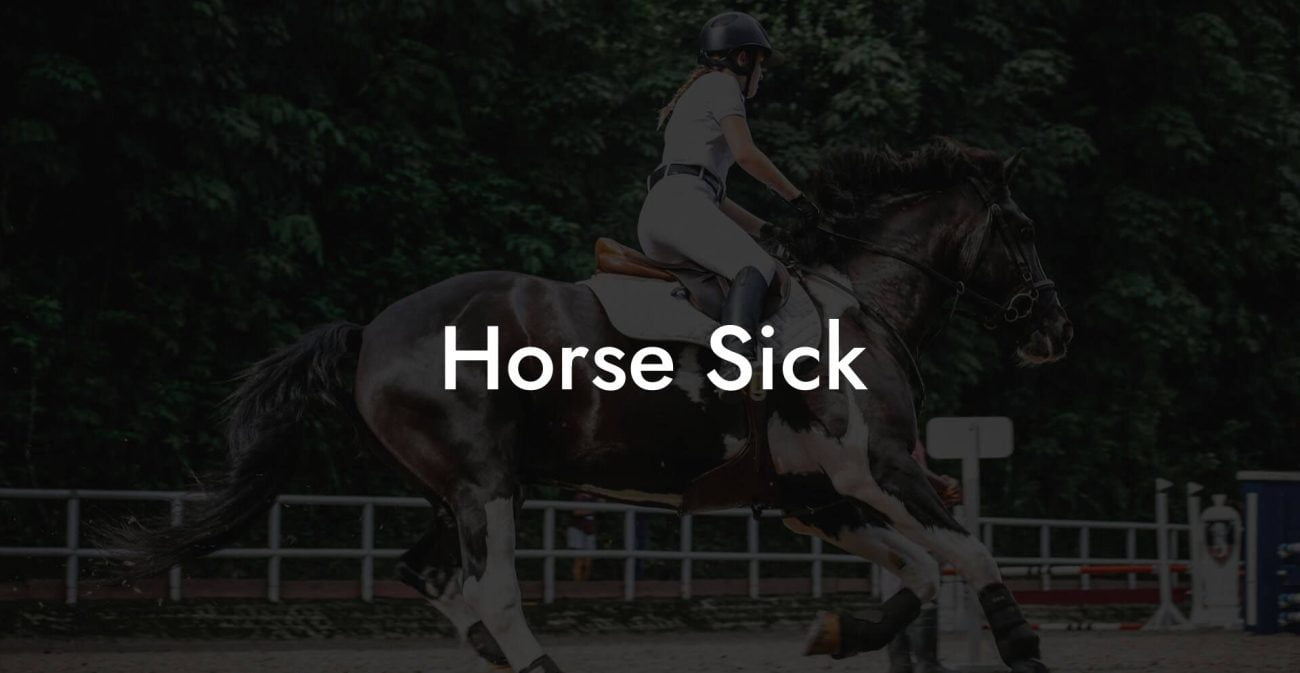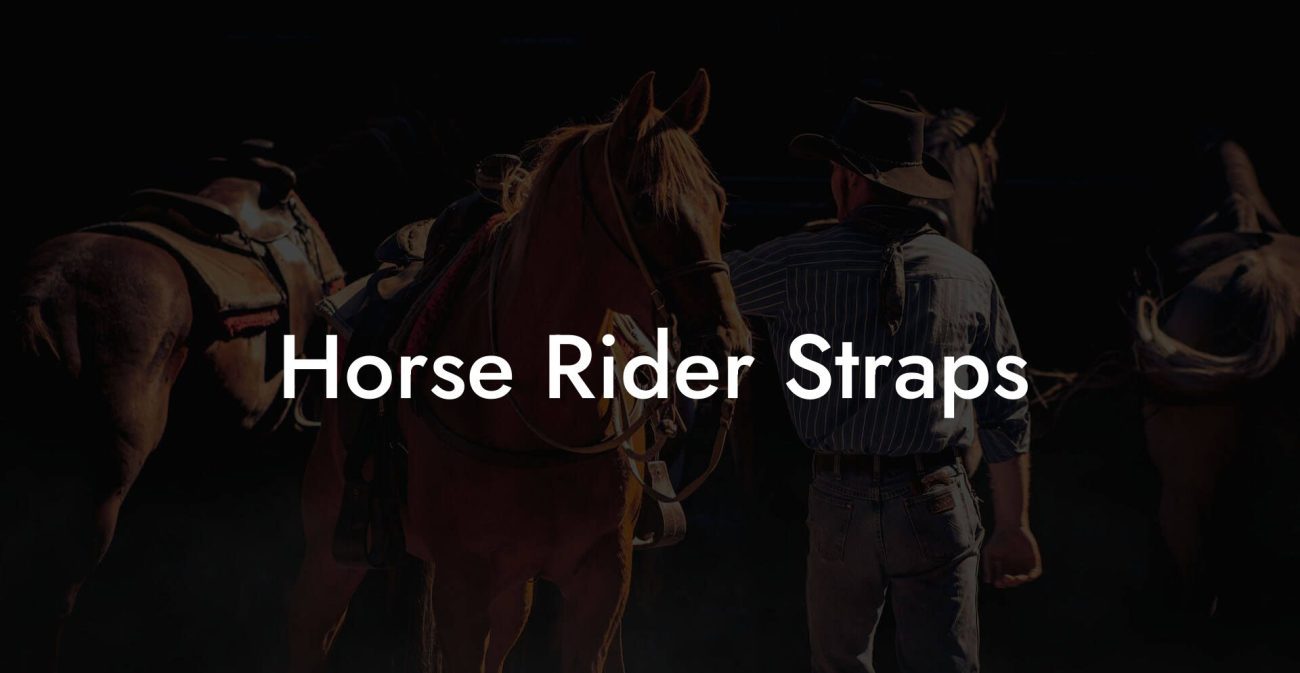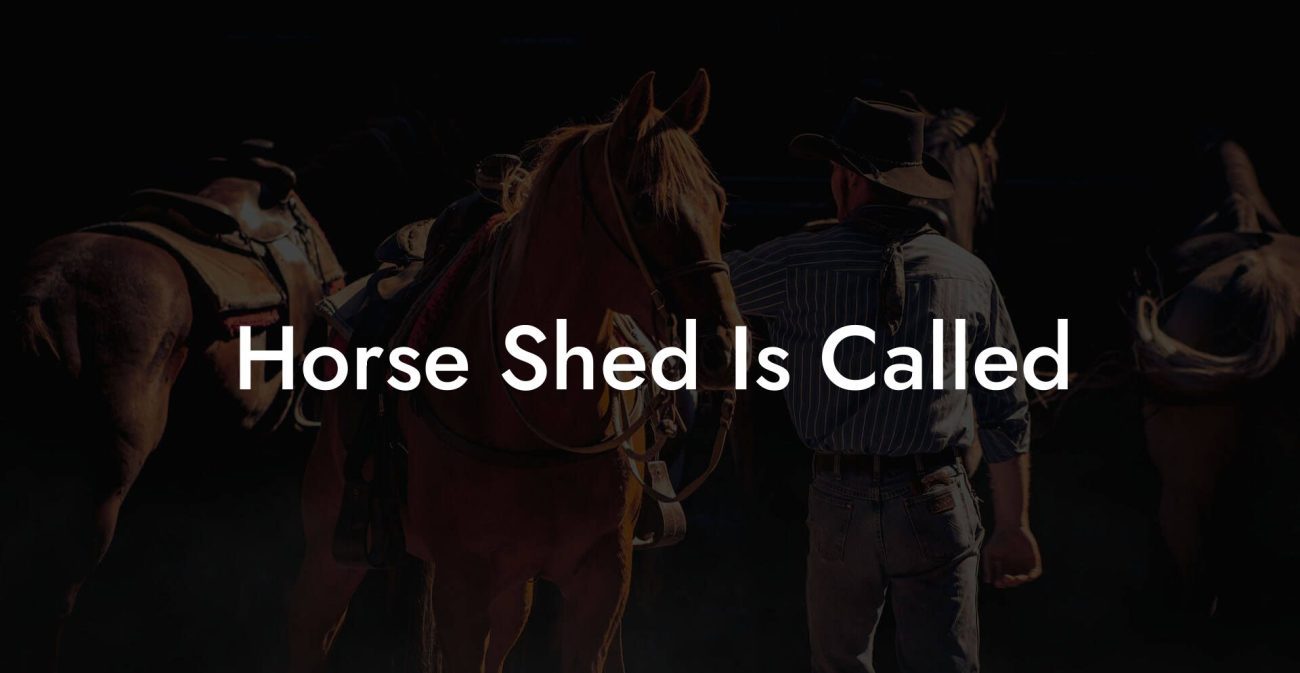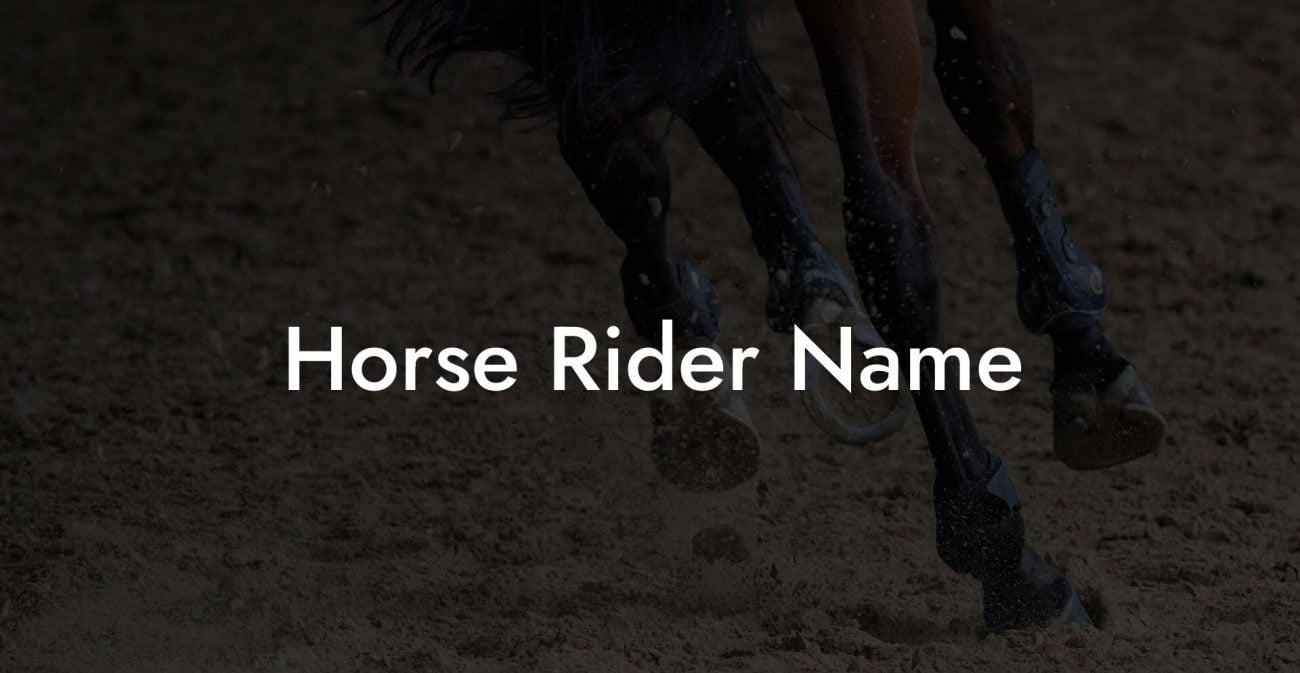Picture this: you're at the barn, grooming your horse while the sun sets in a brilliant display of orange and pink, and suddenly, bam!, a tiny, buzzing ninja lands on your equine companion. Not just any fly, but the notorious horse fly, whose reputation for turning a peaceful moment into a chaotic rodeo is well-known in equine circles. But have you ever stopped to ask, “What is the purpose of horse flies?” Beyond being the pests that disrupt your chill vibe lies a surprisingly complex world of ecological roles, evolutionary quirks, and an unexpected connection to the very essence of equine health. Buckle up as we dive deep into the buzzing life of these winged wonders, blend a generous dose of humor with serious insights, and equip you with savvy tips to care for your horse in an increasingly fly-infested world.
Quick Links to Useful Sections
- A Closer Look at Horse Flies: More Than Just Pesky Pests
- The Ecological Role of Horse Flies: Nature’s Unwitting Balancers
- An Equine Perspective: How Horse Flies Impact Your Horse
- Natural and Modern Approaches to Managing Horse Fly Infestations
- Integrated Pest Management (IPM): The Holistic Approach
- Natural Remedies and DIY Solutions
- High-Tech Tools for the Modern Barn
- Debunking Myths: What Horse Flies Are REALLY Up To
- The Future of Horse Fly Research and Equine Health
- Resources and Community Support: Your Next Steps in Equine Health and Pest Control
- Building a Fly-Free Equine Environment: Innovative Tips for Horse Owners
- Smart Stall Design
- Personalized Equine Care Routine
- Tech-Driven Monitoring
- Equine Health and Sustainable Practices: The Broader Picture
- Frequently Asked Questions About Horse Flies and Equine Care
- Your Journey to a Fly-Free Equine Environment
A Closer Look at Horse Flies: More Than Just Pesky Pests
Horse flies, belonging to the Tabanidae family, are far more than just annoying irritants on a summer day. With their oversized eyes, distinctive landing style, and a bite that makes you question nature’s sense of irony, these insects have some pretty fascinating secrets of their own. While their primary claim to fame might be their painful, blood-sucking habit (think of them as the vampires of the insect world), horse flies actually play several roles in nature that many have yet to appreciate.
It might surprise you to know that horse flies are not simply “nature’s pests.” They are important components in the ecosystem, contributing to processes like nutrient cycling and even serving as food sources for other wildlife. In a sense, these buzzing critters maintain a balance within the intricate web of life, a role that is both beneficial and, admittedly, sometimes inconvenient when it comes to the care of our beloved equine friends.
For those of you new to the world of equine care, understanding the purpose of horse flies can change your perspective on these creatures from mere nuisances to essential actors in the drama of nature. And for the savvy Gen Z and millennial horse enthusiasts, this deeper insight might just become the cornerstone of your next eco-conscious pest management plan!
The Ecological Role of Horse Flies: Nature’s Unwitting Balancers
Before you reach for that can of repellent, it’s worth considering the ecological nuances of horse flies. Yes, their raucous buzz and painful bite might have you categorizing them as outlaws of the insect kingdom, but they’re actually playing an integral role in the ecosystem. Let’s break down some of these lesser-known contributions:
- Population Control Agents: By feeding on mammals and birds, horse flies assist in regulating the populations of various species. Their bites can weaken or deter potential overpopulators, thereby contributing to a natural balance. Think of them as the reluctant referees in the game of nature.
- Nutrient Recyclers: When a horse fly feeds, it not only takes in blood but also leaves behind a trail of diluted nutrients. This process, while minuscule in scale, contributes to the recycling of nutrients in the environment, a natural composting system driven by evolution.
- Food Sources for Other Species: Birds, frogs, and even some predatory insects include horse flies in their diets. Without these winged vampires, many creatures would struggle to find sufficient food, especially in ecosystems where every morsel counts.
While the idea of celebrating a bug that bites might seem counterintuitive, the ecological contributions of horse flies are a reminder that every creature, no matter how pesky, has a role in the tapestry of life. Embracing these insights can transform the way you manage equine care and pest control by inspiring a more holistic and respectful approach to the natural world.
An Equine Perspective: How Horse Flies Impact Your Horse
Let’s get real. If you own or care for horses, you know that a horse fly’s bite is no laughing matter. These feisty insects not only irritate your horse but can also lead to a host of complications if left unchecked. From stress-induced behaviors to skin infections, horse flies can negatively impact your horse’s overall health.
Imagine your horse, normally graceful and composed, suddenly tossing its head and whinnying in discomfort as a horse fly goes after its tender skin. That’s not just an annoyance, it can be a sign of deeper issues:
- Stress and Behavioral Changes: Constant irritation from horse flies can make your horse anxious and agitated. Stress in horses can lead to decreased appetite, poor performance, and even reduced immune function, making them more susceptible to illness.
- Skin Irritations and Infections: The bite of a horse fly can create wounds that, if scratched or left untreated, may become infected. Infections can complicate the healing process and even require veterinary intervention.
- Impact on Performance: Whether you ride competitively or just for leisure, a distracted and uncomfortable horse is less likely to perform at its best. The constant annoyance of horse flies can detract from training sessions and daily routines.
As a dedicated equine caretaker, it’s essential to be proactive about managing horse fly encounters. Not only do you want to shield your horse from pain and discomfort, but you also want to ensure that their overall well-being is not compromised by these opportunistic biters.
Natural and Modern Approaches to Managing Horse Fly Infestations
So, how do you strike the perfect balance between coexisting with nature and protecting your horse from relentless horse flies? The answer lies in combining traditional wisdom with modern technology, a strategy that resonates well with our eco-conscious, tech-savvy generation.
Integrated Pest Management (IPM): The Holistic Approach
Integrated Pest Management (IPM) is all about using multiple strategies to control pests with minimal environmental impact. The approach is simple: prevent, monitor, and manage. Here are some IPM tactics tailored for horse fly management:
- Cultural Controls: Keep your pastures and stables clean. Regularly removing manure and standing water helps reduce the breeding grounds for horse flies and other pests.
- Physical Barriers: Use fly sheets, masks, and even strategically placed screens in barns to protect your horse from direct fly attacks. Modern materials are lightweight, breathable, and surprisingly stylish (yes, even horse fashion can be eco-chic!).
- Biological Controls: Encourage natural predators such as birds and bats. Installing bat boxes and bird feeders (away from horses) can attract these insectivores, naturally reducing the horse fly population.
- Chemical Controls: When necessary, opt for targeted, eco-friendly insecticides. Always consult your veterinarian or an equine pest specialist before applying any chemicals to ensure they’re safe for your horse and the environment.
Natural Remedies and DIY Solutions
Not everyone is keen on reaching for synthetic sprays, especially if you’re a fan of all-natural solutions. Here are some friendly, green strategies to keep horse flies at bay:
- Herbal Repellents: Essential oils like eucalyptus, citronella, lavender, and neem can be mixed with water and a drop of natural soap to create a safe, effective spray. These blends not only repel horse flies but also give your stable a pleasantly fresh scent.
- Vinegar Traps: Setting up a simple trap with apple cider vinegar, sugar, and a bit of water can lure and drown pesky horse flies. It’s a low-cost, DIY approach that harnesses basic chemistry for high-impact pest control.
- Strategic Planting: Consider planting fly-repelling herbs such as basil, mint, and rosemary around your stable area. These natural fortresses act as a subtle deterrent, letting nature do its part in safeguarding your barn.
High-Tech Tools for the Modern Barn
For the digitally inclined equine enthusiast, technology offers an array of innovative solutions. From automated insect traps to smart wearable devices that monitor barn temperature and humidity (factors that can influence fly behavior), modern tech is revolutionizing pest management in stables.
Imagine a future where sensors alert you about a surge in horse fly activity, allowing you to deploy countermeasures before your horse even notices. With integrated systems and mobile apps geared toward equine wellness, managing a fly-free environment is not only possible, it’s on the horizon!
The integration of these natural, traditional, and modern methods underscores a powerful message: Effective pest management is not about waging war against nature but rather about harmonizing with it, using a multi-faceted approach to create balance.
Debunking Myths: What Horse Flies Are REALLY Up To
There are plenty of tall tales swirling around horse flies, many of which are as exaggerated as the tales of Bigfoot. Let’s separate fact from fiction and get to the heart of what these buggers are really about.
Myth 1: Horse Flies Only Suck Blood Out of Malice
In reality, while the blood-feeding behavior of female horse flies (male horse flies typically sip on nectar) might seem sinister, it’s a necessary part of their reproductive cycle. The nutrients in blood are crucial for producing eggs. It’s not about cruelty, it’s pure, evolutionary biology.
Myth 2: Horse Flies Are a Modern Menace
Horse flies have been buzzing around long before our modern era. They have evolved alongside other species in balanced ecosystems, fulfilling roles that go well beyond annoying horses. Their existence points to a complex web of interactions in nature, a reminder that every creature, no matter how pesky, has its place.
Myth 3: There’s No Way to Coexist Peacefully with Horse Flies
While it’s true that horse flies can be incredibly bothersome, advances in both natural and technological pest management mean that a harmonious relationship is possible. It’s all about informed strategies and respecting nature’s boundaries.
By debunking these myths, we open the door to a broader understanding of horse flies. Instead of vilifying them completely, recognizing their ecological contributions and the evolutionary forces behind their behavior helps us develop smarter, more empathetic approaches to equine care.
The Future of Horse Fly Research and Equine Health
As we look to the future, one thing is clear, the study of horse flies is evolving, and with it, our approaches to equine care. Researchers are delving deeper into the behavior, genetics, and ecological impact of these insects, uncovering insights that could revolutionize pest management and horse health alike.
Emerging technologies in genetic research, such as CRISPR and bioinformatics, are not only helping scientists understand the lifecycle of horse flies but are also paving the way for innovative control strategies. Imagine being able to disrupt the reproductive cycle of these insects in an eco-friendly way, minimizing the need for chemical pesticides while protecting your horse from their relentless sting.
On the equine care front, holistic approaches that integrate nutritional support, stress reduction techniques, and informed pest management protocols promise a future where pests like horse flies become manageable components of a balanced ecosystem. This is especially crucial for Gen Z and millennial horse owners who are seeking sustainable and responsible care practices that benefit both their animals and the environment.
The convergence of advanced research and practical equine care strategies heralds a new era of collaboration between scientists, veterinarians, and horse owners. It’s a future-oriented perspective that invites you to join the conversation, learn more about cutting-edge findings, and actively participate in shaping a healthier, fly-managed environment.
Resources and Community Support: Your Next Steps in Equine Health and Pest Control
Navigating the complex world of horse fly management and equine care doesn’t have to be a solo adventure. Whether you’re a seasoned horse owner or a new enthusiast eager to learn, there are abundant resources and communities out there ready to support you. Here are some of the best ways to continue your journey:
- Local Equine Clubs and Associations: Many communities offer clubs and associations focused on horse care. These groups provide valuable advice, share personal experiences about dealing with pests, and offer hands-on training sessions on integrated pest management.
- Veterinary and Agricultural Extension Services: Your local veterinarian or agricultural extension office can be a treasure trove of information on natural and technological pest control strategies. They often host workshops, distribute informative literature, and can provide tailored recommendations for your specific situation.
- Online Communities and Forums: Platforms like Reddit, specialized Facebook groups, and online equine care forums are great spaces to discuss your challenges and triumphs. These digital communities are filled with practical tips, DIY solutions, and shared experiences from fellow horse enthusiasts who get it.
- Workshops and Webinars: The digital age has ushered in a wealth of online webinars and virtual workshops on equine health, pest management, and sustainable farming practices. These sessions can keep you abreast of the latest research and technological innovations in the field.
- Scientific Journals and Publications: For the curious minds, accessing research papers, articles, and publications on entomology and equine health can provide deeper insights into the fascinating intersections of nature and animal care. Many of these publications are available online and can offer cutting-edge perspectives on innovative pest control strategies.
By tapping into these rich resources, you’re not just managing the nuisance of horse flies, you’re becoming part of an informed and proactive community dedicated to the holistic care of our equine companions.
Building a Fly-Free Equine Environment: Innovative Tips for Horse Owners
Now that you’re armed with knowledge about the true purpose of horse flies, it’s time to take practical steps toward a more fly-free and harmonious equine environment. Here are some innovative tips and tricks that blend old-school wisdom with modern technology:
Smart Stall Design
The design of your barn or stable can make a substantial difference in managing horse fly populations. Consider these improvements:
- Optimize Ventilation: Proper air circulation can discourage horse flies, which prefer still, humid air. Upgrading your barn’s ventilation system not only benefits equine comfort but also helps in reducing pest accumulation.
- Screened Areas: Installing screens on windows and openings minimizes the opportunities for horse flies to invade your stable while maintaining natural light and airflow.
Personalized Equine Care Routine
Introduce a routine that integrates regular grooming sessions with pest management. Besides keeping your horse looking dapper, frequent grooming:
- Helps monitor your horse’s skin for signs of irritation or infection.
- Can incorporate soothing herbal therapies like diluted aloe or chamomile, which not only calm the skin but might also act as a mild repellent when applied at key times.
- Provides a chance for you to bond with your animal, turning pest management into a mutually beneficial ritual.
Tech-Driven Monitoring
Embrace the age of smart farming by using technology to monitor pest activity. With sensor-based solutions that track temperature, humidity, and fly population surges, you can adopt preventive measures even before your horse notices a fly hovering around.
Consider installing smart cameras or partnering with local agricultural tech innovators to keep tabs on pest patterns. These tools not only warn you of impending fly invasions but also help fine-tune your integrated pest management strategies for maximum efficiency.
By implementing these innovative approaches, you’ll create a sanctuary where your horse can thrive, free from the constant buzzing of unwanted guests.
Equine Health and Sustainable Practices: The Broader Picture
At its core, effective horse fly management is part of a broader commitment to sustainable equine care. When you adopt practices that respect the balance of nature, blending technology with traditional wisdom, you’re not only enhancing your horse’s well-being, but also contributing to a healthier environment.
Think of it this way: by carefully managing pests through eco-friendly methods, you’re reducing the need for harsh chemicals that could inadvertently harm beneficial insects, soil quality, and even neighboring wildlife. It’s a ripple effect that underscores your role as a stewards of nature.
Integrating sustainable practices into your equine care routine can transform your stable into a model of environmental responsibility. From organic feed and natural grooming products to energy-efficient barns and water-conserving practices, every small choice you make adds up to a healthier planet for horses and humans alike.
This holistic approach not only benefits your immediate farm or stable but also resonates with a growing global movement toward sustainable agriculture and responsible animal husbandry. It’s about building a legacy of care, one that future generations of horse lovers can proudly uphold.
Frequently Asked Questions About Horse Flies and Equine Care
Below are some commonly asked questions about the purpose of horse flies and their impact on equine health. We’ve also integrated schema markup to ensure this valuable information is easily discoverable by search engines.
1. What is the natural purpose of horse flies in the ecosystem?
Horse flies play important roles in nutrient recycling, population control of certain species, and serve as a food source for birds and other predators. Their blood-feeding behavior, while unpleasant, is critical for their reproductive cycle.
2. How do horse flies affect my horse’s health?
Constant horse fly attacks can increase stress, lead to skin irritations and infections, and disrupt your horse’s overall comfort and performance. Managing their presence is essential for maintaining optimal equine health.
3. What natural remedies can help repel horse flies?
Natural repellents using essential oils (like citronella, eucalyptus, and lavender), herbal sprays, and even vinegar traps can help reduce horse fly activity near your horse. Additionally, planting fly-repelling herbs around the stable is beneficial.
4. Can modern technology help in managing horse fly infestations?
Yes, smart sensors, automated traps, and data-driven pest monitoring systems are increasingly used to predict and control fly populations in equine environments, making pest management more targeted and efficient.
5. Is it possible to create a fly-free environment for my horse?
While it might be unrealistic to eradicate horse flies completely, combining integrated pest management, environmental modifications, and proactive equine care can significantly reduce their presence and minimize their impact.
6. How can I balance ecological concerns with the need to protect my horse?
Embracing sustainable pest management strategies, such as organic repellents and biological controls, helps maintain the ecological balance while ensuring your horse stays comfortable and healthy.
7. What are some common myths about horse flies?
Common myths include the idea that horse flies are merely destructive pests with no ecological role and that they exist only to annoy. In reality, they play significant roles in natural processes and serve as a vital food source for other organisms.
Your Journey to a Fly-Free Equine Environment
Embracing the realities behind horse flies is more than just a lesson in entomology, it's a call to action for every horse lover determined to create a calm, balanced, and environmentally friendly haven for their equine companions. While these insects are an inevitable part of nature, understanding their purpose and managing their impact through integrated, sustainable methods can empower you to transform your stable into a sanctuary of comfort.
By combining age-old wisdom with innovative modern strategies, you can reduce the nuisance factor of horse flies while respecting the natural processes they assist. Invest in eco-friendly repellents, embrace technology for smart monitoring, and join communities of equine enthusiasts who share your commitment to sustainable care. Every thoughtful step you take enhances your horse’s well-being and contributes to a broader movement toward compassionate, enlightened animal stewardship.
So the next time a horse fly buzzes past, instead of reaching for a quick swat, take a moment to appreciate the complexity of nature, its relentless energy, its interwoven relationships, and its capacity to inspire new approaches in equine care. Your journey to a fly-free, balanced environment begins with knowledge, continues with innovation, and flourishes through community. Stay curious, stay proactive, and let the lessons of even the tiniest creature spark your next breakthrough in horse care.
Welcome to a future where understanding nature’s quirks becomes the first step towards creating a healthier, more resilient environment for your horse, and by extension, for yourself.

